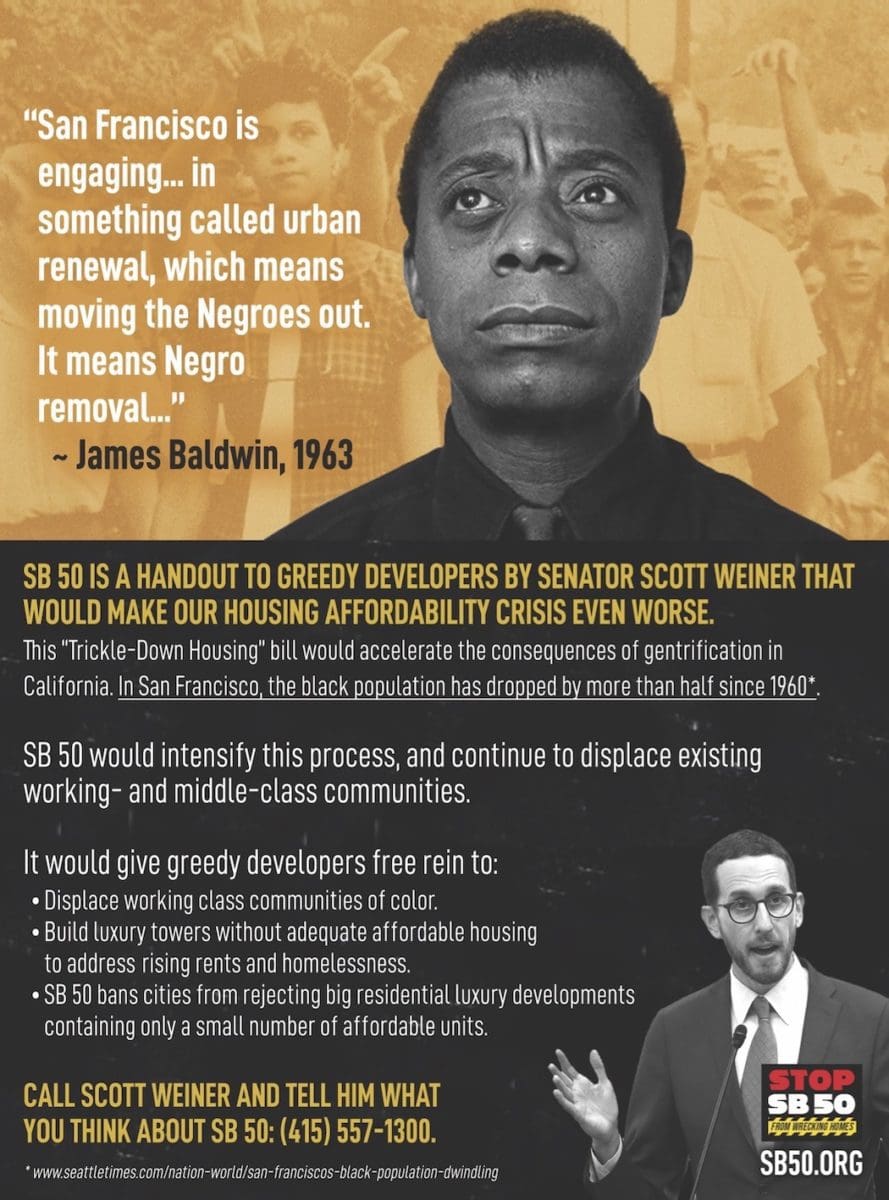Last week, California State Sen. Scott Wiener took umbrage to a mailer sent out by AIDS Healthcare Foundation that featured a quote by renowned writer and civil rights activist James Baldwin. The mailer and a TV ad are part of a months-long advocacy effort by AHF and Housing Is A Human Right, the housing advocacy division of AHF, to inform the public about the major flaws in Wiener’s housing bill, SB 50.
In 1963, Baldwin said, “San Francisco is engaging… in something called urban renewal, which means moving the Negroes out. It means Negro removal…” Baldwin was shining a light on what “urban renewal” meant in reality: the displacement of African American residents. He was proved right. Urban renewal, and what we now call gentrification, would end up slamming the African American community in San Francisco over the next several decades. It should be noted that the term “gentrification” wasn’t coined until 1964 by British sociologist Ruth Glass.
While urban renewal and gentrification aren’t exactly the same processes, pretending there are no continuities between both is wrong. Both urban renewal and gentrification depend on the disempowerment of poorer communities; the power of unaccountable political and economic interests; and, ultimately, the replacement of poorer communities for the benefit of developers and the affluent.
In his statement, Baldwin was hitting upon the use of code words by elected officials to camouflage such things as displacement and widespread demolition of working-class dwellings. In 1963, “urban renewal” was a code word. Today, code words for gentrification include “revitalization,” “neighborhood change,” and “disruption.” As housing justice activists widely know, when a politician says a working-class neighborhood is being “revitalized,” what is actually happening on the street is gentrification and displacement. The connections in AHF’s mailer between SB 50, code words, and gentrification and displacement are valid, needed, and important.
“For years,” says former AHF Board Chair and current Board Vice Chair Cynthia Davis, a long-time HIV/AIDS activist and advocate in the African American community in Los Angeles, “code words have been used to hide the fact that gentrification and displacement are devastating communities of color. Whether it’s ‘urban renewal’ or ‘revitalization,’ it’s all the same. AHF’s mailer uncovers that harmful sleight of hand.”
Soon after the AHF mailer was sent to San Francisco residents, Wiener took to Twitter, tweeting insults and misinformation. It was another sad example of a politician governing, and insulting, by Twitter.
On Tuesday, April 16, Wiener sent out a chain of 13 tweets. The tweets came only hours after the Los Angeles City Council voted unanimously to oppose his bill, SB 50. Just before the vote, LA Councilman Paul Koretz said the bill was a “handout for developers.” LA Councilman Mike Bonin said: “I’ve got a neighborhood, Del Rey—mainly low-income, mainly Latino community—that would be ravaged by this. There’s not enough protection in there.”
The vote was a major blow to SB 50—only a week earlier, the San Francisco Board of Supervisors voted to oppose the bill. Coalition for Economic Survival Executive Director Larry Gross praised the San Francisco supervisors’ vote. Describing SB 50 as a “trickle-down economic bill,” he said it “will undermine affordable housing, increase gentrification and displacements, and will destroy the quality of life for low-income and working families.”
The AHF mailer featuring Baldwin makes the same points offered by Koretz, Bonin, and Gross. It notes that “SB 50 is a handout to greedy developers,” that the bill will continue to “displace existing working- and middle-class communities,” that the bill will “displace working class communities of color,” that “SB 50 bans cities from rejecting big residential luxury developments containing only a small number of affordable units,” and that the “trickle-down housing bill would accelerate the consequences of gentrification in California.” These issues must be addressed in any discussion about housing policy and, specifically, about SB 50.

In fact, on April 14, UC Berkeley’s Urban Displacement Project released a report about SB 50. While finding that the bill will increase the number of market-rate housing units to be built, the report also noted the need for improvements within SB 50 with regards to displacement and affordable housing and that “more consideration is needed regarding equitable development goals.”
So by the early evening of April 16, perhaps sensing trouble for SB 50, Wiener went to Twitter with his 13 tweets, slamming AHF with inaccuracies and insults. Wiener falsely tweeted that the group Livable California was funded by AHF. It is not, and Wiener eventually tweeted a correction. Wiener insultingly described AHF President and Co-Founder Michael Weinstein as an “egomaniac.” Weiner tweeted that AHF “hired an investigator” to write the report “Selling Out California: Scott Wiener’s Money Ties to Big Real Estate.” Again, Wiener is wrong. The author of the report, award-winning journalist Patrick Range McDonald, has been a staff member of Housing Is A Human Right since 2017. His title is “special investigator.” Wiener, a state senator, also tweeted that AHF seeks to “stop new housing.” That is wrong.
AHF was founded in 1987 as a housing organization for terminally ill AIDS patients when they were treated like lepers. It was a crisis, and AHF acted swiftly. In 2017, AHF again moved quickly to address housing affordability and homeless crises in Los Angeles by repurposing hotels in Downtown L.A. and Hollywood to create new low-income housing. In fact, AHF is currently looking to build a new affordable-housing tower in Florida.
AHF saw that rising housing costs and gentrification were threatening the health of AHF patients, who need affordable, stable housing to maintain good health. AHF took action. Like many other organizations, including Kaiser Permanente, AHF believes our housing affordability crisis is a serious public health issue.
AHF’s mission statement is “cutting-edge medicine and advocacy regardless of ability to pay.” The SB 50 mailer carries out the mission of “cutting-edge advocacy,” which has guided AHF’s work for more than 30 years. AHF now serves more than one million patients around the world, providing life-saving HIV drug treatment in 43 countries, including the United States, Mexico, South Africa, Uganda, India, China, and Russia. AHF has saved countless lives around the globe.
AHF’s official core values include “respect for diversity” and “fight for what’s right.” Again, the SB 50 mailer is carrying out those values by highlighting the life-altering problems experienced by working-class communities of color caused by displacement and gentrification.
Wiener, who is heavily funded by the real estate industry (read the Housing Is A Human Right report, “Selling Out California: Scott Wiener’s Money Ties to Big Real Estate”), is attempting to divert the public’s attention away from the significant issues at hand by slamming AHF. It’s an old politician’s trick that’s been used for decades.
“Scott Wiener should focus on the very real fear that SB 50 will hurt middle- and working-class communities, especially those of color,” says Housing Is A Human Right Director René Christian Moya. “Our job is to hold elected officials accountable for their policies. Housing Is A Human Right will continue to press Wiener with our concerns about the scope of the bill and its effects on poor and working-class communities. The well-being of millions of Californians will be negatively impacted by SB 50 in its current form. As an advocacy organization, we would be failing in our work if we did not stand up for them.”

